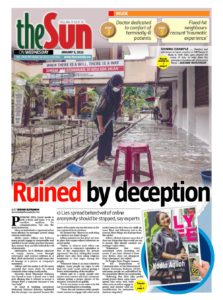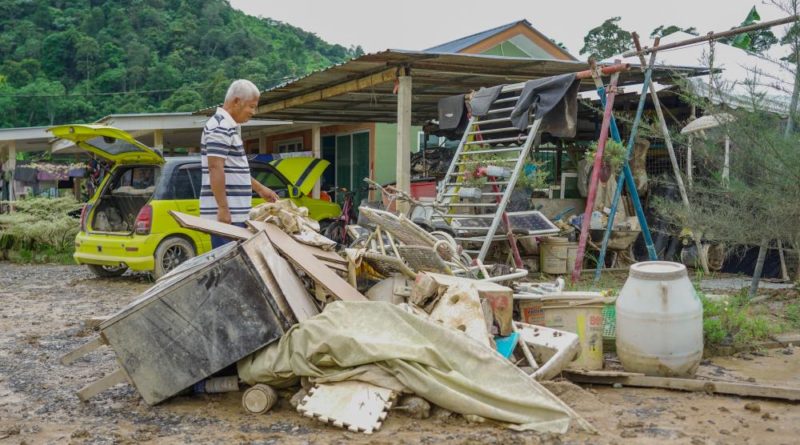HEADLINE-RE:TYPHON-RAI: PETALING JAYA, Malaysia- Neighbours recount trauma of ‘unforgettable night’
Shaharuddin clearing debris at his house. Amirul Syafiq/THESUNpix
.
.

PETALING JAYA: For neighbours Shaharuddin Ibrahim and Datin Mahani Ahmad Aziz, Mother Nature’s fury and man’s folly combined to give them a night they would never forget.
It was the night of Dec 18 and like many parts of the country, a torrential downpour had left their homes in Batu 14 Hulu Langat inundated.
.
,
.
 ___________________________
___________________________
SPACE RESERVE FOR ADVERTISEMENT
_________________________________________________
.
Recounting the night’s experience, Shaharuddin said the water level at his single-storey house had risen to knee level by 9pm.
It was then that a neighbour invited him, his wife and their two grandsons to his home a short distance away.
However, three hours later, the water level was already chest high and Shaharuddin was forced to take his family to an office nearby where they sought shelter on the roof.
 ___________________________
___________________________
SPACE RESERVE FOR ADVERTISEMENT
_________________________________________________
.
In Mahani’s home, conditions were equally bad. The water level rose two to three metres, forcing her whole family to wait out the floods on the upper floor of their two-storey house.
Shaharuddin claimed that ongoing construction work on a highway project nearby had left the drainage system badly clogged, trapping rainwater in their neighbourhood.
Prime Minister Datuk Seri Ismail Sabri Yaakob also attributed the poor drainage in the area to failure by the contractors to ensure proper flow.
However, Selangor Mentri Besar Datuk Seri Amirudin Shari said it was a gush of water flowing down the river that led to the floods.
The developer of the highway project and the Malaysian Highway Authority (MHA) had yet to respond to theSun’s request for comments at press time.
Shaharuddin and Mahani, who have lived in Hulu Langat for the past 30 years, said it was the worst flooding they have experienced.
 ___________________________
___________________________
SPACE RESERVE FOR ADVERTISEMENT
_________________________________________________
.
“There were occasions when it flooded after a downpour but it was usually only ankle deep and would recede after a few hours,” Shaharuddin said.
On the night of Dec 18, he had called the Civil Defence Force but was told that they were too far away and there were too many obstacles, rendering it impossible for rescue boats to reach them.
To compound matters, the children were hungry and fretting about being stuck on the roof.
Shaharuddin said that being senior citizens, the adults were also feeling tired after a few hours.
Even after the floodwaters had receded, their troubles were far from over. The cleaning process was a challenge.
“The water, mixed with oil and mud, left stains on the walls and floor.”
The two families also lost their furniture, appliances and electronic devices. Shaharuddin’s small vegetable patch had been washed away and an oven they used to prepare ready-to-eat meals for sale was destroyed.
“We were making about RM2,000 a month from the sale of vegetables and food but now we have to live solely on my wife’s RM300 pension,” he said.
Meanwhile, Mahani’s seven cars were badly damaged. She said she had to pay a company more than RM5,000 to clean her house and to purchase seven large trash bins, which cost RM350 each, to dispose the damaged items.
Fortunately for the two families, several non-governmental organisations later arrived with food, mattresses and pillows, providing temporary relief.
The children were sent to their respective parents’ homes while the adults busied themselves cleaning up with the help of a few volunteers.
Shaharuddin said he had raised the matter of clogged drains caused by the construction of the highway project with MHA and the project owner, but nothing had been done.
 ___________________________
___________________________
SPACE RESERVE FOR ADVERTISEMENT
_________________________________________________
TRIVIA:
Typhoon Rai
| Typhoon (JMA scale) | |
|---|---|
| Category 5 super typhoon (SSHWS) | |

Typhoon Rai at its initial peak intensity while approaching the Philippines on December 16
|
|
| Formed | December 12, 2021 |
| Dissipated | December 22, 2021 |
| Highest winds | 10-minute sustained: 195 km/h (120 mph) 1-minute sustained: 260 km/h (160 mph) |
| Lowest pressure | 915 hPa (mbar); 27.02 inHg |
| Fatalities | 410 total, 80 missing |
| Damage | > $794.72 million (2021 USD) (Third-costliest in Philippine history) |
| Areas affected |
|
| Part of the 2021 Pacific typhoon season | |
Typhoon Rai, known in the Philippines as Typhoon Odette, was a powerful and catastrophic tropical cyclone that struck the Philippines. Rai became the first Category 5-equivalent super typhoon to develop in the month of December since Nock-ten in 2016, and the third Category 5 super typhoon recorded in the South China Sea, following Pamela in 1954 and Rammasun in 2014. The twenty-second tropical storm, the ninth typhoon, and the fifth super typhoon of the 2021 Pacific typhoon season, the system originated from a tropical disturbance near the equator on December 10, forming near the site of another low-pressure area that had dissipated on the previous day. Conditions around the system were favorable for further development, and it slowly developed into a tropical depression on December 12. On the same day, the United States Joint Typhoon Warning Center (JTWC)[nb 1] issued a Tropical Cyclone Formation Alert (TCFA) on the consolidating depression. Further intensification ensued, and Rai was upgraded to a tropical storm the next day, before passing south of Ngulu Atoll. After passing near Palau and impacting the island nation, Rai entered the Philippine Area of Responsibility (PAR) by the night of December 14, where the Philippine Atmospheric, Geophysical and Astronomical Services Administration (PAGASA) named it “Odette”. On the next day, both the JMA and JTWC raised the system’s intensity to a low-end Category 1-equivalent typhoon, as an eye continued to appear. While approaching the Philippines, Rai unexpectedly rapidly intensified into a Category 5 super typhoon[nb 2] just before its first landfall across Siargao. It then slowly but steadily weakened as it traversed the Visayas, exiting into the Sulu Sea. After making its last landfall over Palawan, Rai continued to weaken before unexpectedly re-intensifying into a Category 5-equivalent typhoon by December 18, while nearing Vietnam. On the next day, Rai entered yet another weakening phase, dissipating on December 22, southeast of Hong Kong.
Tropical cyclone warnings were issued for areas in the Philippines and parts of the Caroline Islands as Rai developed. Early bulletins were issued by PAGASA for Rai, starting on December 12 due to the persistent track of the system towards the country. As the storm neared the country, land travels were canceled, along with flights and ferry operations. People living near coastal areas and into the track of the storm were urged to evacuate. Fishing vessels were also docked into safety and many provinces in the Visayas started to prepare for the storm’s brunt. Storm signals were also raised by PAGASA, first focusing on parts of the Visayas and Mindanao, before further expanding into southern Luzon. Food and non-food packages were also prepared by the Department of Social Welfare and Development (DSWD) for the evacuees, along with standby funds worth near $15,000. Forced evacuations were conducted as Rai further approached the country, with some people in the Bicol Region being warned of possible lahars from Mayon Volcano. A festival in Antique was also affected, along with vaccination drives across the affected regions. Fishing vessels across the coastal areas of Vietnam were moved into safety while thousands of people were prepared to be evacuated due to the storm. Flight services were halted and crops were harvested early.
As Rai pounded the Philippines, heavy rainfall, strong and gusty winds impacted several areas around the storm’s path. Many areas across the Visayas and Mindanao lost electricity with several provinces and areas being deprived further of communication services. Downed trees obstructed many roadways, and flooding was a major problem across the affected regions, particularly Bohol, where the storm was described as “one of the worst for the province”. Rivers also overflowed across Cagayan de Oro, while numerous buildings sustained damages. Surigao City was reported to be completely damaged, and appealed for aid. Bohol also pleaded for help to the government due to the damages Rai brought to the area. A state of calamity has been placed in the province and Cebu. So far, 406 people have died, a large portion of which were from the severely affected island of Bohol. Damages at the aforementioned location were projected to be worth ₱5 billion ($100 million), with those in Siargao being estimated to be worth ₱20 billion ($401 million) and those in Negros Occidental being estimated to be worth ₱5.9 billion ($118 million). According to the United Nations, 13 million people are expected to be affected in the Philippines. At least 1,147 are injured, with 83 missing.[3] Many public and private facilities were also harmed as a result of the storm.
 ___________________________
___________________________
SPACE RESERVE FOR ADVERTISEMENT
_________________________________________________
















